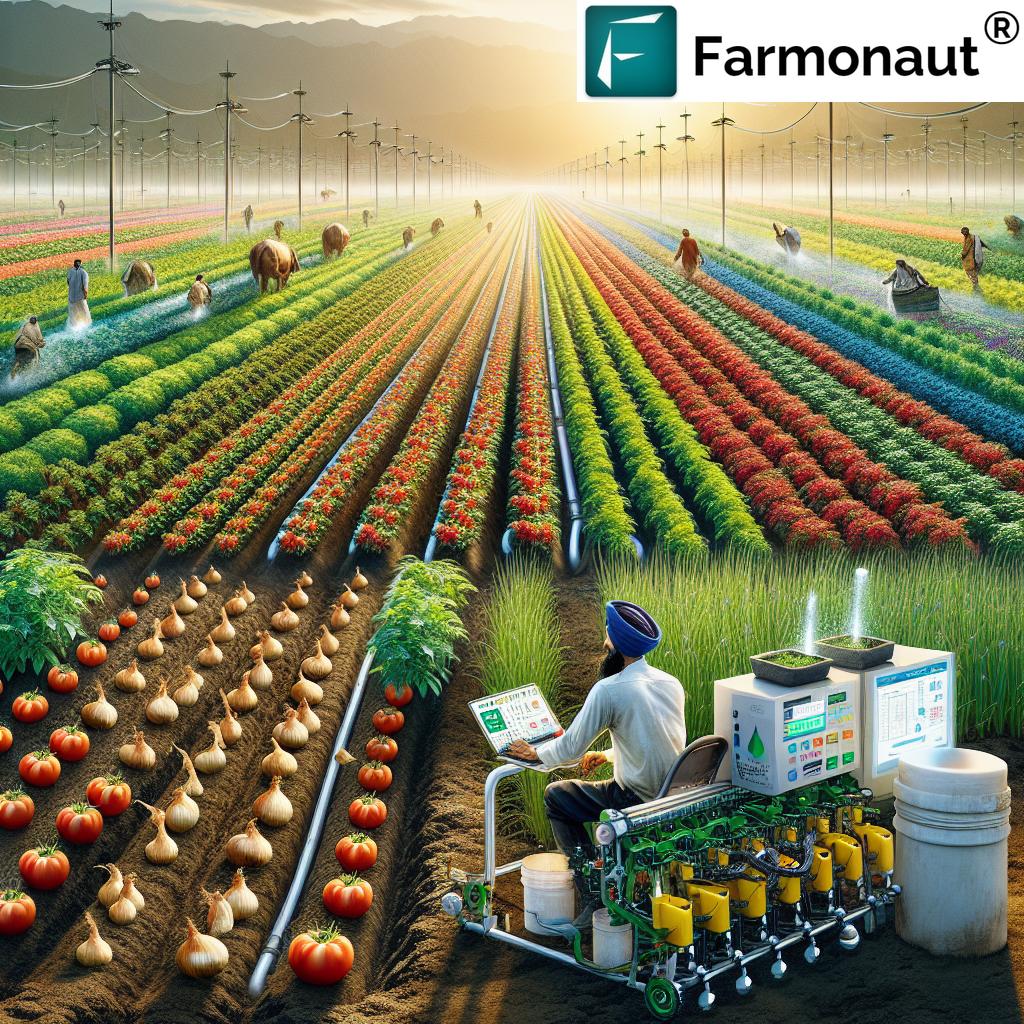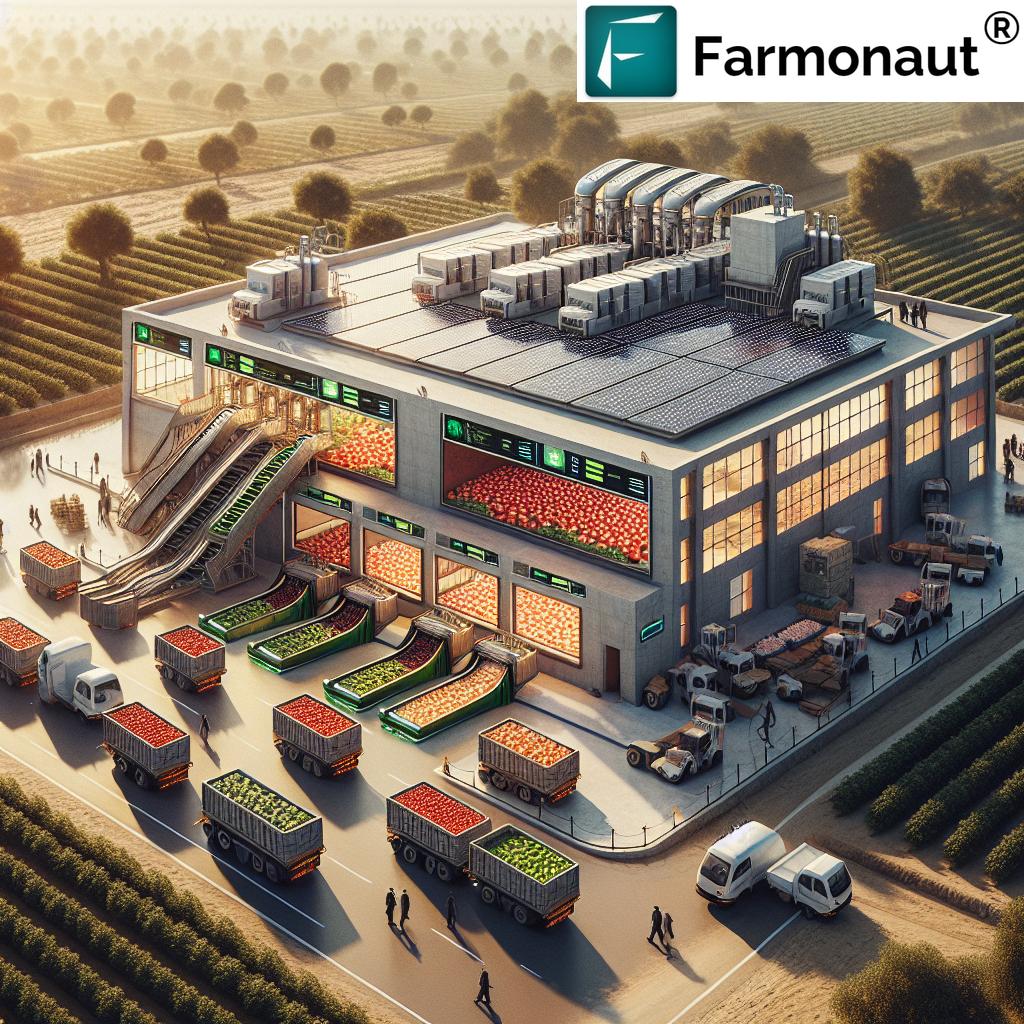Transforming Punjab’s Agriculture: Sustainable Vegetable Farming with Smart Irrigation and Mechanized Cultivation
In the heart of Pakistan’s agricultural landscape, Punjab is undergoing a remarkable transformation. We are witnessing a new era of sustainable vegetable farming that promises to revolutionize the way we grow our essential edibles. With the launch of a groundbreaking Rs. 3 billion agricultural project, Punjab is set to become a model for modern, efficient, and environmentally conscious farming practices.

“Punjab’s Rs. 3 billion agricultural project offers a 70% government subsidy on essential farming tools and value addition machinery.”
This ambitious initiative focuses on two key areas: mechanized tomato cultivation and onion production. By embracing smart irrigation monitoring and cutting-edge agricultural equipment, Punjab aims to boost productivity while ensuring sustainable practices. Let’s delve into the details of this transformative project and explore how it’s set to change the face of vegetable farming in the region.
The Core Components of Punjab’s Agricultural Revolution
- Smart Irrigation Monitoring
- Mechanized Cultivation
- Government Subsidies
- Farmer Training
- Market Connections
Each of these components plays a crucial role in the overall success of the project. Let’s examine them in detail to understand how they contribute to sustainable vegetable farming in Punjab.
Smart Irrigation Monitoring: The Future of Water Management
Water is a precious resource, especially in agriculture. In Punjab, the new project introduces smart irrigation monitoring systems that revolutionize how farmers manage water usage. These systems use advanced sensors and data analytics to provide real-time information about soil moisture levels and crop water requirements.
By implementing smart irrigation monitoring, we can:
- Reduce water waste by up to 30%
- Optimize crop growth by providing the right amount of water at the right time
- Prevent over-irrigation, which can lead to soil degradation and reduced yields
- Save energy costs associated with unnecessary pumping
Farmonaut, a leading agricultural technology company, offers satellite-based farm management solutions that complement these smart irrigation systems. Their platform provides valuable insights into vegetation health and soil moisture levels, helping farmers make informed decisions about irrigation.
Mechanized Cultivation: Boosting Efficiency and Productivity
The project places a strong emphasis on mechanized tomato cultivation and onion production. By introducing modern agricultural equipment, Punjab aims to increase productivity and reduce the physical burden on farmers. Some of the key machinery being introduced includes:
- Automated planters for precise seed placement
- Mechanized pruners for efficient plant maintenance
- Advanced harvesting equipment for faster and more efficient collection
These tools not only speed up the farming process but also ensure consistency in planting and harvesting, leading to higher-quality produce. The mechanization of vegetable farming in Punjab is expected to increase yields by up to 25% while reducing labor costs.
Government Subsidies: Making Modern Farming Accessible
One of the most significant aspects of this agricultural transformation project is the substantial government subsidy on essential farming tools and value addition machinery. Farmers can benefit from a remarkable 70% subsidy, making it easier for them to adopt modern farming practices.
The subsidies cover a wide range of equipment, including:
- Planters and pruners for efficient cultivation
- Pulping units for value addition to tomatoes
- Dryers and graders for onion processing
By providing these subsidies, the government ensures that farmers of all scales can access the tools they need to improve their productivity and income. This democratization of modern farming techniques is crucial for the overall success of the project and the sustainable development of Punjab’s agricultural sector.
Farmer Training: Empowering the Agricultural Workforce
“Farmer enterprise groups in Punjab will receive training through field schools to enhance skills in modern agriculture techniques.”
The success of any agricultural transformation relies heavily on the knowledge and skills of the farmers themselves. Recognizing this, the project includes comprehensive training programs for farmer enterprise groups through field schools. These training sessions focus on:
- Modern agriculture techniques
- Smart farming practices
- Efficient use of new machinery
- Sustainable pest management
- Water conservation methods
By enhancing the skills of local farmers, the project ensures that the benefits of mechanization and smart irrigation are fully realized. This knowledge transfer is crucial for the long-term sustainability of the initiative.

Market Connections: Bridging Local Farmers to International Markets
A key objective of the agricultural transformation project is to connect local farmers with international markets. This aspect of the initiative aims to:
- Increase farmers’ income by accessing higher-value markets
- Promote Punjab’s vegetables on a global scale
- Encourage farmers to maintain high-quality standards
- Create a sustainable export model for Punjab’s agricultural produce
By facilitating these connections, the project not only benefits individual farmers but also contributes to the overall economic growth of the region. The focus on international markets also drives the adoption of global best practices in farming and quality control.
Target Districts and Crop Focus
The project has strategically selected specific districts for tomato and onion cultivation, ensuring that resources are allocated effectively. The target areas include:
- Tomato Cultivation: Lodhran, Multan, and Vehari
- Onion Production: Khushab, Sheikhupura, and Muzaffargarh
By focusing on these areas, the project aims to create specialized zones for vegetable production, leveraging the unique soil and climate conditions of each region to maximize yields and quality.
Cost-Effective Production Methods
A central goal of this initiative is to implement cost-effective production methods for essential vegetables. By reducing production costs, the project aims to:
- Ensure affordable prices for consumers
- Increase profit margins for farmers
- Enhance the competitiveness of Punjab’s vegetables in international markets
The combination of mechanization, smart irrigation, and targeted farmer training contributes to this cost-effectiveness, creating a win-win situation for both producers and consumers.
Explore Farmonaut’s API for advanced agricultural insights
The Role of Technology in Sustainable Vegetable Farming
Technology plays a pivotal role in the transformation of Punjab’s agricultural landscape. Companies like Farmonaut are at the forefront of this technological revolution, offering solutions that complement the government’s initiatives. Some key technological advancements include:
- Satellite-based crop health monitoring
- AI-driven advisory systems for personalized farm management
- Blockchain-based traceability for supply chain transparency
- Advanced weather forecasting for better crop planning
These technologies not only enhance productivity but also contribute to the overall sustainability of farming practices in Punjab.
Environmental Impact and Sustainability
The sustainable vegetable farming initiative in Punjab is not just about increasing production; it’s also about ensuring long-term environmental sustainability. The project incorporates several eco-friendly practices:
- Water conservation through smart irrigation
- Reduced chemical use through precision farming techniques
- Soil health improvement through sustainable cultivation methods
- Carbon footprint reduction through efficient machinery use
By adopting these practices, Punjab is setting a precedent for environmentally responsible agriculture that can be replicated across other regions.
Access Farmonaut’s API Developer Docs for integration insights
Economic Impact on Farmers and the Region
The economic implications of this agricultural transformation project are significant. We anticipate several positive outcomes:
- Increased income for farmers due to higher yields and better market access
- Job creation in the agricultural technology and machinery sectors
- Boost to the local economy through increased agricultural exports
- Reduced reliance on imports for essential vegetables
These economic benefits are expected to have a ripple effect, contributing to the overall development of Punjab and improving the quality of life for its residents.
Challenges and Future Prospects
While the sustainable vegetable farming initiative in Punjab holds great promise, it’s important to acknowledge the challenges that lie ahead:
- Adapting to new technologies and farming methods
- Ensuring equitable access to subsidies and training
- Maintaining soil health in intensive cultivation areas
- Balancing production increases with market demand
Addressing these challenges will be crucial for the long-term success of the project. However, with continued government support, technological advancements, and farmer engagement, the future of vegetable farming in Punjab looks bright.
Punjab’s Sustainable Vegetable Farming Initiative – Key Components
| Component | Description | Estimated Impact |
|---|---|---|
| Smart Irrigation Monitoring | Advanced sensors and data analytics for optimal water usage | 30% reduction in water waste, improved crop health |
| Mechanized Cultivation | Introduction of modern agricultural equipment for tomato and onion farming | 25% increase in yields, reduced labor costs |
| Government Subsidies | 70% subsidy on essential farming tools and value addition machinery | Increased adoption of modern farming techniques across all farm sizes |
| Farmer Training | Field schools and enterprise groups for skill enhancement | Improved farming practices, higher productivity |
| Market Connections | Linking local farmers to international markets | Potential 40% increase in farmer income, expanded export opportunities |
Conclusion: A New Chapter in Punjab’s Agricultural Story
As we conclude our exploration of Punjab’s sustainable vegetable farming initiative, it’s clear that we’re witnessing a pivotal moment in the region’s agricultural history. This Rs. 3 billion project is not just an investment in farming; it’s an investment in the future of Punjab and its people.
By embracing smart irrigation monitoring, mechanized cultivation, and providing substantial government support, Punjab is setting the stage for a more productive, sustainable, and profitable agricultural sector. The focus on tomato and onion cultivation in specific districts showcases a strategic approach to maximizing the impact of these innovations.
As farmers receive training in modern agricultural techniques and gain access to international markets, we anticipate a ripple effect that will boost the entire economy of Punjab. The emphasis on cost-effective production methods ensures that these benefits will be felt not just by farmers, but by consumers as well, through more affordable essential vegetables.
The integration of cutting-edge technologies, such as those offered by companies like Farmonaut, further enhances the potential of this initiative. Satellite-based crop monitoring, AI-driven advisories, and blockchain traceability are set to become integral parts of Punjab’s agricultural landscape.
While challenges remain, the comprehensive nature of this project – addressing everything from water management to market access – provides a strong foundation for overcoming these hurdles. As Punjab moves forward with this transformative initiative, it has the potential to become a model for sustainable vegetable farming not just in Pakistan, but across the globe.
The future of agriculture in Punjab is bright, green, and sustainable. As we watch this project unfold, we’re not just observing the transformation of farming practices; we’re witnessing the growth of a more resilient, efficient, and prosperous agricultural ecosystem that will benefit generations to come.
FAQ Section
Q1: What is the main focus of Punjab’s agricultural transformation project?
A1: The project focuses on sustainable vegetable farming, particularly mechanized tomato cultivation and onion production, using smart irrigation monitoring and modern agricultural equipment.
Q2: How much subsidy is the government offering on farming tools?
A2: The government is offering a 70% subsidy on essential farming tools and value addition machinery.
Q3: Which districts are targeted for tomato and onion cultivation?
A3: Tomato cultivation is targeted in Lodhran, Multan, and Vehari, while onion production focuses on Khushab, Sheikhupura, and Muzaffargarh.
Q4: How will farmers receive training in modern agriculture techniques?
A4: Farmer enterprise groups will receive training through field schools to enhance their skills in modern agriculture techniques.
Q5: What are the expected benefits of this agricultural transformation project?
A5: Expected benefits include increased productivity, cost-effective production, improved farmer incomes, access to international markets, and more affordable prices for essential vegetables.






